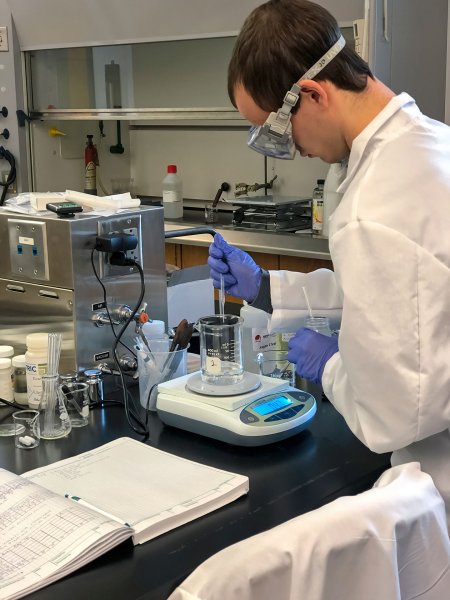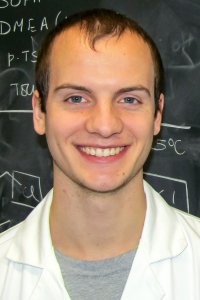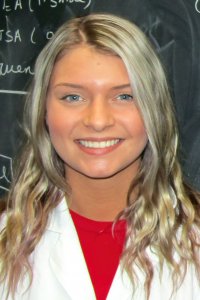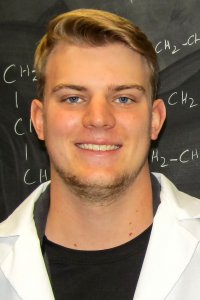Cool Beans
Airable Research Lab Studies Soybeans with Help from Ohio Wesleyan Labs, Student Interns

Plant a handful of these legumes, and you really will grow a magic beanstalk. Soybeans today are helping to address environmental challenges as components of earth-friendly products including detergents, powder coatings, and plastics.
At Ohio Wesleyan University, soybeans also are helping students to learn more about bio-based chemistry through internships with Airable Research Lab, a commercial laboratory located inside OWU’s Schimmel/Conrades Science Center.
“We’re excited to be on campus and to work with Ohio Wesleyan students,” said Barry McGraw, founder and chief laboratory officer of Airable Research Lab.
Airable is a business line of the Ohio Soybean Council (OSC), which has been at the forefront of soy-based research and development for more than 20 years. Historically, OSC outsourced its research, but decided to change that strategy two years ago, leading to its relationship with Ohio Wesleyan.
“We thought, why not do our own research?” McGraw said. “But first, we needed our own laboratory space. I called Dale Brugh [OWU’s associate dean for innovation], ran the idea by him, and here we are.”
OSC initially rented one campus laboratory but, convinced of the venture’s potential, signed a three-year lease in October for three labs, enabling Airable’s official business launch on Nov. 1. Airable also has on-campus space inside The Delaware Entrepreneurial Center at Ohio Wesleyan University, where McGraw’s office is based.
In addition to its team of chemists, Airable’s labs also support three Ohio Wesleyan student interns: two chemistry majors and one finance economics major.

Senior Josh Queener of Cardington, Ohio, has been working with the venture since February 2019. Currently, Queener is helping to develop a bio-based catalyst that converts soy-based fatty acids into safe chemicals for use in plasticizers, coatings, and surfactants (compounds capable of acting as detergents, wetting agents, emulsifiers, foaming agents, or dispersants).
“It's allowing me to gain valuable experience working in a commercial lab,” Queener said of his internship, which also supports his plan to enroll in graduate school to study inorganic chemistry.

Junior Kaytlin Ward of Delphos, Ohio, began her Airable internship in December. She is working on a soy-based, anti-static plasticizer for use in products as diverse as PVC pipes, blood bags, flip flops, and even vinyl siding.
The objective is to make the plastic more flexible and less likely to break. The plasticizer would replace phthalates, shown in animal studies to harm reproductive systems. Ward’s work includes running instruments to collect data for the lab and setting up reactions.
Ward said she appreciates the experience because “the internship gives me the opportunity to gain more work experience while staying on campus.” After graduation, she plans to pursue a doctorate in chemistry.

Junior Jack Funderburg of Westerville, Ohio, also began his internship in December and is helping with marketing, including Airable’s Facebook page, as well as project planning to help set scientist schedules and client deliverables.
The experience is “giving me an interesting look into the soybean industry and chemistry in general,” said Funderburg, who plans an East Coast career in asset or wealth management after he graduates in May 2021.
“All three OWU interns have plenty to keep them busy,” McGraw said.
Airable researchers spend about half their time on internal research – including the staff’s own concepts – and the other half on projects for external clients and commercial companies. Current efforts include working with Columbus-based Battelle on surfactants to make crude oil easier to extract from rock formations and with an Australia-based company on coatings to protect concrete roofing.
The focus on innovation helped inspire the business’s unusual name. “Airable” is a homophone for “arable” (or tillable), McGraw said, invoking the laboratory’s agricultural stakeholders. But the lab also is focused on new technologies – developing them and facilitating their adoption in the marketplace.
“‘Airable’ makes me think of innovations flying out the door,” McGraw said. “Every week, we’re shipping something to a client.”

Learn more about Airable Research Lab at www.airableresearchlab.com, more about The Delaware Entrepreneurial Center at OWU at www.owu.edu/delaware-entrepreneurial-center, and more about studying chemistry at Ohio Wesleyan at www.owu.edu/chemistry.
